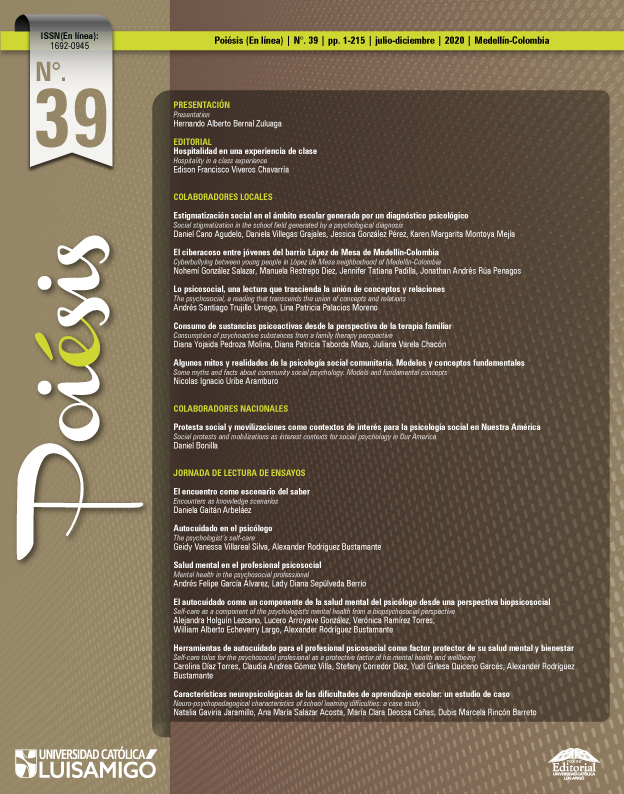Social stigmatization in the school field generated by a psychological diagnosis
DOI:
https://doi.org/10.21501/16920945.3749Keywords:
Stigmatization, Psychological diagnosis, School, Identity, Adolescence.Abstract
This research arises from the question of social stigmatization in the school field
generated by a psychological diagnosis. The educational context is the scene of various
dynamics that influence the process of student development, there are stages of
transition such as the transition from elementary to high school, in a period of life in
which the adolescent is in full construction of his identity. It is a stage of adaptation to the
environment, this being a period of vulnerability that can be significantly affected when
the students also carries with them a psychological diagnosis that can generate social
stigma. This research was conducted on the basis of a theoretical trace and a unique
case study, in which an interview was conducted with a student with an established
diagnosis, another to its mother, a teacher and two psychologists of the educational
institution. It was possible to identify the categories of diagnosis, school subject and
identity in relation to stigmatization, and from rigorous work of tracking and analysis, it
was concluded that having a psychological diagnosis is highly related to social stigma
and labeling by other people, which has important implications for the psychosocial
development of the stigmatized person, generating negative repercussions such as
low self-esteem, insecurity, depression, isolation, aggressiveness, stress, social fear,
shyness, feeling incapacity, among other impacts that can arise from stigmatization
processes.
Downloads
References
Aláez-Fernández, M., Martínez-Arias, R. y Rodríguez-Sutil, C. (2000). Prevalencia de trastornos psicológicos en niños y adolescentes, su relación con la edad y el género. Psicothema, 12(4), 525-532. http://www.psicothema.com/pdf/367.pdf.
Campo-Arias, A. y Herazo, E. (2015). El complejo estigma-discriminación asociado a trastorno. Revista Colombiana de Psiquiatría, 44(4), 243-250. http://dx.doi.org/10.1016/j.rcp.2015.04.003.
Chala-Bernal, L. y Matoma-Fetiva, L. (2013). La construcción de identidad en la adolescencia (Tesis de pregrado, Universidad Pedagógica Nacional). Repositorio. http://repositorio.pedagogica.edu.co/bitstream/handle/20.500.12209/2535/TE-16019.pdf?sequence=1&isAllowed=y.
Corrigan, P. W., & Watson, A. C. (2002). Understanding the Impact of Stigma on People with Mental Illness. World Psychiatry, 1(1), 16-20. https://www.ncbi.nlm.nih.gov/pmc/articles/PMC1489832/
Echavarría-Grajales, C. V. (2003). La escuela: un escenario de formación y socialización para la construcción de identidad moral. Revista Latinoamericana de Ciencias Sociales, Niñez y Juventud, 1(2), 15-43. http://www.scielo.org.co/scielo.php?script=sci_arttext&pid=S1692-715X2003000200006&lng=en&tlng=es.
Fernández, D. y Malvar, L. (2011). El papel de la escuela en la transición a la vida activa del/la adolescente: Buscando buenas prácticas de inclusión social. Revista de Formación e Innovación Educativa Universitaria, 4(2), 101-114. http://refiedu.webs.uvigo.es/Refiedu/Vol4_2/REFIEDU_4_2_3.pdf
Goffman, E. (2001). Estigma: la identidad deteriorada. Amorrortu.
Iglesias, M. (2006). Diagnóstico escolar: Teoría, ámbitos y técnicas. Pearson Educación.
Mena-Moreno, F. (2016). ¿Procesos de estigmatización en el aula?: Una aproximación a las realidades de los estudiantes de grado séptimo de la Institución Educativa Alfonso López Pumarejo de la ciudad de Pereira (Tesis de pregrado, Universidad Tecnológica de Pereira). Repositorio. http://hdl.handle.net/11059/6422.
Ministerio de Salud y Protección Social (Minsalud). (2014). ABECÉ sobre la salud mental, sus trastornos y estigma. https://www.minsalud.gov.co/sites/rid/Lists/BibliotecaDigital/RIDE/VS/PP/abc-salud-mental.pdf.
Muñoz, M., Pérez, E., Crespo, M. y Guillén, A. (2009). Estigma y enfermedad mental: Análisis del rechazo social que sufren las personas con enfermedad mental. Universidad Complutense de Madrid.
Naranjo-Pereira, M. (2007). Autoestima: un factor relevante en la vida de la persona y tema esencial del proceso educativo. Revista Electrónica Actualidades Investigativas en Educación, 7(3), 1-27. http://www.redalyc.org/pdf/447/44770311.pdf.
Rabadán-Rubio, J. y Giménez-Gualdo, M. (2012). Detección e intervención en el aula de los trastornos de conducta. Educación XX1, 15(2), 185-212. http://www.redalyc.org/pdf/706/70624504006.pdf.
Robles-Martínez, B. (2008). La infancia y la niñez en el sentido de identidad. Comentarios en torno a las etapas de la vida de Erik Erikson. Revista Mexicana de Pediatría, 75(1), 29-34. https://www.medigraphic.com/pdfs/pediat/sp-2008/sp081g.pdf
Ruiz-Guevara, L., Castro-Pérez, M. y León-Sáenz, A. (2010). Transición a la secundaria: los temores y preocupaciones que experimentan los estudiantes de primaria. Revista Iberoamericana de Educación, 52(3), 1-13. https://doi.org/10.35362/rie5231793
Stake, R. (1998). Investigación con estudio de casos. Morata.
Supèr, H., y Cañete, J. (2016). Hacia un diagnóstico más objetivo del TDAH: El papel de la vergencia ocular. Revista de Psiquiatría Infanto-juvenil, 33(3), 3-11. https://www.researchgate.net/publication/331139982_Hacia_un_diagnostico_mas_objetivo_del_TDAH_el_papel_de_la_Vergencia_Ocular
Tello-García, G. (2014). El estigma en personas con enfermedad mental. Trastornos adictivos (Tesis de pregrado, Universidad Pública de Navarra). https://academica-e.unavarra.es/xmlui/bitstream/handle/2454/16223/TFG14-TS-TELLO-68005.pdf?sequence=1&isAllowed=y
Uribe, M., Mora, O. y Cortés, A. (2007). Voces del estigma. Percepción de estigma en pacientes y familias con enfermedad mental. Universitas Médica, 48(3), 207-220. https://www.redalyc.org/pdf/2310/231018668003.pdf
Downloads
Published
How to Cite
Issue
Section
License
La revista y los textos individuales que en esta se divulgan están protegidos por las leyes de copyright y por los términos y condiciones de la Licencia Creative Commons Atribución-No Comercial- 4.0 Internacional. Permisos que vayan más allá de lo cubierto por esta licencia pueden encontrarse en http://www.funlam.edu.co/modules/fondoeditorial/ Derechos de autor.











